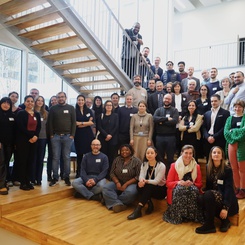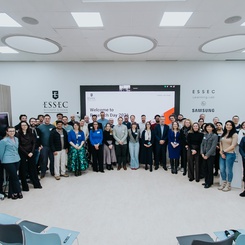With ESSEC Knowledge Editor-in-chief
Universities, including ESSEC, are dedicated to nurturing budding entrepreneurs. Many higher education institutions are also looking to become more entrepreneurial themselves, pursuing different revenue streams and changing their processes. Steven Seggie and his colleagues Baris Uslu, Alper Calikoglu, and F. Nevra Seggie analyzed a selection of the existing literature on entrepreneurial universities in their recent paper in Higher Education Quarterly to better understand the entrepreneurial university and the entrepreneurial academic, finding that much of the discourse has focused on commercialization of academic activities.
Higher education institutions have a responsibility to contribute to the economic and social well-being of their communities. The notion of the entrepreneurial university has evolved in response to this: it positions the university as a “triple helix model”, in which contributing to economic development by applying research findings in business practices is added to the traditional goals of teaching and research (Etzkowitz, 1993). This means that there are increasing connections between universities and industry, which helps transfer academic knowledge into tangible outcomes. Higher education researchers have explored how these activities impact internal dynamics and impact the entrepreneurial university’s social and economic development goals, while business, economics, and policy researchers have focused mainly on certain activities such as the role of business incubators in nurturing entrepreneurship.
Academic entrepreneurship can be defined as “creating economic and/or social transformation beyond the boundaries of the academy” (Mars & Rios-Aguilar, 2010, p. 455). Various aspects of academic entrepreneurship have been explored, including its impact on recruitment policies, organizational design, and pedagogical and research activities.
The researchers aimed to bring together the body of research to identify common entrepreneurial activities of institutions and academics and better understand their value for organizational transformation.
Studying the entrepreneurial university and the entrepreneurial academic
To better understand entrepreneurship and academia, the research team conducted a meta-synthesis of the literature, including 25 articles published in higher education journals in their final sample.These papers included universities from a wide variety of countries, including Australia, Canada, Chile, Japan, the United States, the United Kingdom, and more. These articles focused on the economic and social development of these entrepreneurial universities, emphasizing that universities should foster an entrepreneurial culture for staff as well as students and establishing internal support for innovation. Their analysis also uncovered four main operational themes that universities could undertake to accomplish their aim of contributing to their community’s social and economic development, namely:
-
Alternative income and resource generation: including activities like commercializing research and knowledge (the most common one), alumni donations, university services and products, research funds
-
Collaboration with external organisations: working with industry partners and the private sector
-
Knowledge/technology production and transfer: producing and sharing knowledge that can be of use to society, and establishing incubator services, science hubs, innovation and entrepreneurship centres
-
Innovative and creative property acquisition: acquiring trademarks, patents, and licensing, and generally protecting intellectual property rights
Given that academics produce the knowledge and research findings discussed above, they are often implicitly or explicitly expected to manage these entrepreneurial activities. Here, too, the researchers identified that the same four main themes encompass how academics can contribute to their institutions, but with different activities linked to these themes:
-
Alternative income and resource generation: founding new ventures, consulting activities, commercializing research, research funding, external teaching income, creating graduate student funds, and personal revenue from their innovations and knowledge
-
Collaboration with external organisations: working on research projects with industry and maintaining positive relationships, and leading seminars and workshops for industry partners
-
Knowledge/technology production and transfer: disseminating their research and knowledge, developing innovative research, transferring knowledge and technology, and leading the development of incubators and science hubs
-
Innovative and creative property acquisition: keeping their intellectual property rights and acquiring patents and license
The operational activities of entrepreneurial universities and entrepreneurial academics coincide, and can be classified as income diversification and external outreach. This has resulted in a changing academic landscape, with universities experiencing this change differently depending on their circumstances.
What’s next for the entrepreneurial university and its entrepreneurial academics?
This analysis provides us with a holistic understanding of the operational areas and activities of an entrepreneurial university and of entrepreneurial academics. Universities have become more entrepreneurial often as a means of generating income in response to public budget cuts (e.g., De Zilwa, 2005). Being entrepreneurial is also seen as a way to accomplish the university’s mission of giving back to the community by boosting its economic and social value, a form of social entrepreneurship. Entrepreneurial universities seek to infuse students with an entrepreneurial spirit, and produce and transfer practical knowledge and innovations to industry partners and society in general It is, however, important to consider how the activities can conflict with this social mission, if the university becomes too focused on the income generating aspect and less so on their pedagogical and social goals. Many academics are, understandably, interested in external income generation and intellectual property acquisition, which can lead to an individualistic mindset and less of a focus on teaching (e.g. Provasi et al., 2012). That being said, their external collaborations create value for the university, meaning that universities consider networks when recruiting staff, creating a very competitive job market. These networks are also taken into account when making promotion decisions. The researchers outlined some suggestions for working toward creating social value in addition to economic value, to stay true to the heart of the university
Moving toward social entrepreneurship
-
One suggestion is for universities to encourage academics from the “soft” disciplines with external actors, to execute social projects (as opposed to the “hard” sciences, where this is more common practice)
-
It would also be interesting for university stakeholders to develop strategies for evaluating and rewarding entrepreneurial projects that positively impact the community.
Knowledge creation and entrepreneurship go hand in hand, and more and more academics and universities are trying their hand at entrepreneurial activities for a number of reasons, including value creation, disseminating knowledge, and boosting their income. As these activities grow more popular, university actors should ensure that their entrepreneurial activities aren’t taking them away from the core goals of research, teaching, and having a positive social impact. This paper provides us with a concise overview and framework for understanding the entrepreneurial university and where it can go next.
References
De Zilwa, D. (2005). Using entrepreneurial activities as a means of survival: Investigating the processes used by Australian universities to diversify their revenue streams. Higher Education, 50, 387-411. https://doi.org/10.1007/s10734-004-6359-
Etzkowitz, H., & Leydesdorff, L. (1997). Universities and the global knowledge economy. A triple helix of university-industry-government relations. London: Pinter.
Mars, M. M., & Rios-Aguilar, C. (2010). Academic entrepreneurship (re)defined: Significance and implications for the scholarship of higher education. Higher Education, 59, 441-460. https://doi.org/10.1007/s10734-009-9258-1
Uslu, B., Calikoglu, A., & Seggie, F.N., & Seggie, S. (2019). The entrepreneurial university and academic discourses: The meta‐synthesis of Higher Education articles. Higher Education Quarterly, 73. 285-311. 10.1111/hequ.12198.
Provasi, G., Squazzoni, F., & Tosio, B. (2012). Did they sell their soul to the devil? Some comparative case-studies on academic entrepreneurs in the life sciences in Europe. Higher Education, 64(6), 805-829. https://doi.org/10.1007/s10734-012-9530-7









